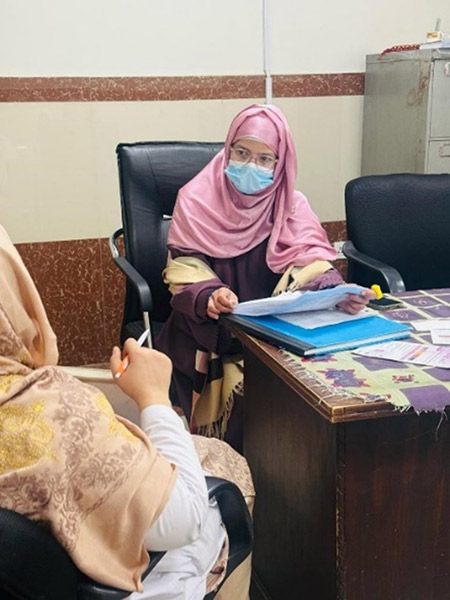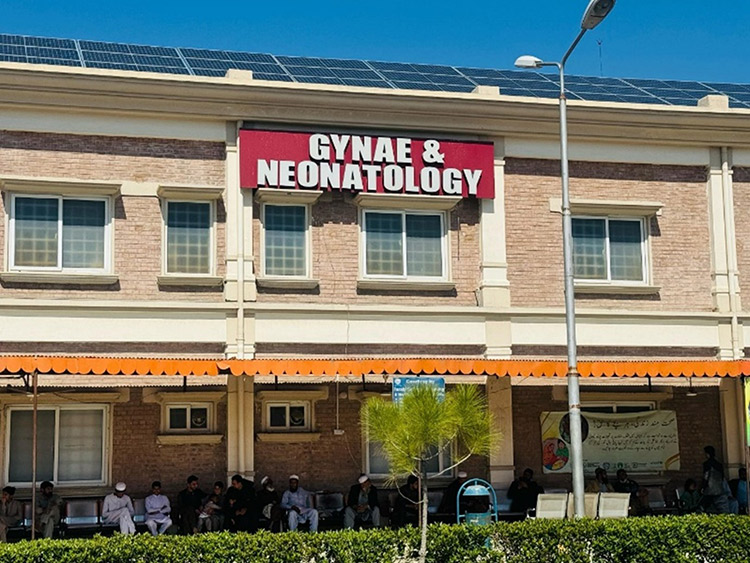 Jalwa Ali at the Women & Children Hospital Rajjar Charsadda in KP province. Photo credit: WHO Pakistan27 March 2025, Islamabad, Pakistan – “It is my mission to eliminate tuberculosis in my area. I am thankful to WHO for providing me with a platform from which I can utilize my abilities to work for the welfare of my people.”
Jalwa Ali at the Women & Children Hospital Rajjar Charsadda in KP province. Photo credit: WHO Pakistan27 March 2025, Islamabad, Pakistan – “It is my mission to eliminate tuberculosis in my area. I am thankful to WHO for providing me with a platform from which I can utilize my abilities to work for the welfare of my people.”
Jalwa Ali works for the World Health Organization (WHO) in Pakistan, supporting the provision of services to people affected by tuberculosis (TB) at the Women & Children Hospital Rajjar Charsadda in Khyber Pakhtunkhwa Province.
Jalwa works on the frontlines visiting patients, raising awareness, gaining the trust of female patients and communities, addressing misconceptions and reducing the stigma associated with the disease.
TB affects over 686 000 people and causes 47 000 deaths annually in Pakistan. The country bears 73% of the TB burden in the Eastern Mediterranean Region and is the 5th most affected in the world.
TB can have severe consequences for women, especially during their reproductive years and pregnancy.
In partnership with WHO, the Provincial and District TB programme and the Reproductive, Maternal and Newborn (RMNCH) programme are working to implement TB screening for antenatal and postpartum women at the Women & Children Hospital Rajjar Charsadda. WHO also supports the use of GeneXpert testing of stool specimens from young children.
The hospital serves a population of 1.6 million and provides outpatient services to over 9800 people each month, including pediatrics (4900), gynaecology (4137), pediatric neonatology (419) and general surgery (394).
“I am thankful to the doctors and staff at the hospital who helped me in the diagnosis and treatment of TB,” said Fatima, an antenatal patient who visited the hospital with a 4-day cough. After receiving treatment, she delivered normally and is now fully recovered.
 Gynae & Neonatology Block, Women & Children Hospital Rajjar Charsadda, Khyber Pakhtunkhwa. Photo credit: WHO Pakistan
Gynae & Neonatology Block, Women & Children Hospital Rajjar Charsadda, Khyber Pakhtunkhwa. Photo credit: WHO Pakistan
Pakistan has increased TB notifications and treatment coverage, reaching nearly 495 000 people in 2024 (70% of the affected population), compared with 331 800 people in 2015 (57% of the affected population). Over the last decade, in partnership with WHO, Pakistan has provided diagnosis and treatment services to 3.7 million people affected by TB.
Despite progress, diagnosing TB in children and pregnant women remains a challenge due to factors such as a lack of information, stigma and hesitation among affected populations.
Jalwa works hard informing women about the importance of being tested for TB, a disease that is curable and preventable. Being from the same area as her patients is her biggest asset. Women feel comfortable sharing their health concerns with her.
For Jalwa, fighting tuberculosis forms part of her personal commitment to serve her community.
“I am passionate about making a difference in the lives of vulnerable populations, and am particularly interested in fighting tuberculosis because of its impact on marginalized communities. I realized that there is a dearth of awareness about tuberculosis among local communities, leading to misconceptions. Ending tuberculosis is now my life’s mission.”




